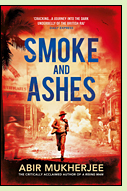Smoke and Ashes
by Abir Mukherjee
Reviewed by Margaret Tomlinson

Third
in a series, Smoke and Ashes is about
a demoralized British policeman in Calcutta in 1921. The year before, Gandhi had taken charge of the anti-colonial movement, beginning the nonviolent, highly
disruptive protests that would eventually win Indian independence.
For
a man with a conscience, enforcing British law in Colonial India comes with a nagging
sense of guilt. Despite the institutional prejudice against the native Indian
population, Captain Sam Wyndham respects his Indian subordinate, Sergeant Surendranath
"Surrender-not" Bannerjee. He also feels attracted to a wealthy and
beautiful Anglo-Indian woman. Tension mounts in these relationships, fed by his guilty conscience. Bannerjee's awareness and disapproval of Wyndham's increasingly
serious opium addiction doesn't make things easier.
All
this internal tension deepens what, even without it, would have been a
nail-biting murder mystery and thriller. The story opens with Wyndham on the roof
of an opium den, fleeing a police raid. He's covered in blood from the corpse
he just stumbled over in a back room; if caught, an end to his career would
be the least of his worries. He doesn't dare report the grisly murder even
when a second body, mutilated in the same way, turns up in the course of his
regular police work.
Meanwhile, the Colonial police force is desperately attempting to maintain order and the status quo as Gandhi's nonviolent movement takes hold. "We could only control India through force of arms," Wyndham realizes, "but force was useless against a people who didn't fight back; because you couldn't kill people like that without killing a part of yourself too." Like the previous two novels in the Wyndham and Bannerjee series, Smoke and Ashes perfectly balances high suspense with its well-researched historical setting, each element masterfully supporting the other. (2019; 332 pages including an Author's Note about the history behind the novel)
More about Smoke and Ashes at Powell's Books or The Book DepositoryOther novels set in Colonial India:
Homespun by Nilita Vachani (2008), a family saga about a couple who marry as teenagers in the early twentieth century - he committed to Gandhi, she to her wardrobe – and their descendants. More info
The Seeker by Sudhir Kakar (2007), about the friendship between Mahatma Gandhi and the daughter of a British admiral who becomes his adoring disciple. More info
The Jewel in the Crown by Paul Scott (1966), about the events that follow the rape of a young Englishwoman during the last years of the Colonial period; #1 in the Raj Quartet. More info
Nonfiction about Gandhi and the movement for Indian independence:
Autobiography: The Story of My Experiments With Truth, by Mohandas K. Gandhi (1925-1929). More info
The Life of Mahatma Gandhi by Louis Fischer (1988). More info
Raj: The Making and Unmaking of British India by Lawrence James (1997). More info
Online:
Satyagraha, an explanation of the principles behind Gandhi's non-violent movement, at the New World Encyclopedia
Back to Directory of Book Reviews